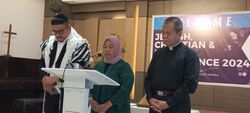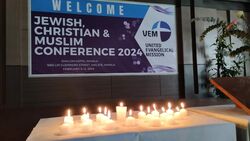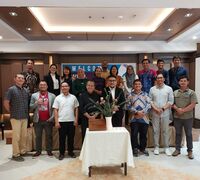20.02.2024

From left to right: Yaakov Baruch, Rabbi of Tondano; Hening Parlan, Country Cordinator of Green Faith Indonesia; Tuhoni Telaumbanua, Lecturer at the Theological Seminary on Nias Island (all three Indonesia).

Candles for Peace: The conference was hosted by the United Church of Christ in the Philippines, a church very experienced in conflict management and peace building.

Conference participants also visited a mosque, a synagogue and a church. All Photos by: UEM
What is Home in an Asian context? And what is it in different religions?
To find answers to this question, people from Judaism, Christianity and Islam came together in Manila, Philippines. The 51st JCM Conference for dialogue between Jews, Christians and Muslims happened on three continents at the same time. The two parallel conferences in Kigali, Rwanda, and in Vallendar, Germany, were connected via video.
During their lectures and discussions, participants in Manila came to see “Home” as something very important for all three religions. The main priority of a Jewish home should be Jewish values, tzedakah (charity, justice) and tikkun olam (repairing the world). In the context of 'oikumene' in Christian perspective, “Home” refers not only to a physical place, but rather to the perception of home as a large community of Christians striving to unite in faith and service. In the Quran, the definition of “Home” is also called al-Maskan, which means a place to obtain peace. The house is thus expected to provide comfort for its residents, both psychologically and physically.
The heart of the conference are the "discussion groups". Here, the conference participants talk about what they have always wanted to ask each other but perhaps never dared to ask. Everything that is said in these groups is confidential.
With a total of 100 participants in all three continents, the conference was somewhat smaller than in previous year. This year, different reasons kept a number of participants from coming: some were for example not granted visa for the Philippines, others did not come for security reasons. The conflict in Israel and Gaza made things sometimes very difficult during the conference and challenged participants’ capacity and ressources to come together in dialogue.
Still, the format of the conference convinced them to the degree of developing it further for the Asian context: In future conferences, members of Buddhism and Hinduism might join the conference, as well as members of Indigenous believes.
UEM supports the conference for many years already: financially, with Human Ressources and by providing its international networks in Asia, Africa and Europe. Interreligious Dialogue is partof the mission and identity of UEM.
IBAN: DE45 3506 0190 0009 0909 08
SWIFT/BIC: GENODED1DKD
spenden@vemission.org
0202-89004-195
info@vemission.org
0202-89004-0
presse@vemission.org
0202-89004-135
CRDB BANK PLC / Branch 3319
Account# 0250299692300
Swift code: CORUTZTZ
Bank BNI
Account# 0128002447
Swift code: BNINIDJAMDN
info@vemission.org
presse@vemission.org